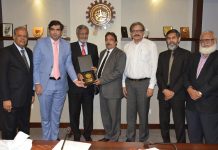ISLAMABAD: As Pakistan and India commenced two days of talks on Indus Water Treaty here on Monday, Minister for Water and Power Khawaja Muhammad Asif emphasised that both India and Pakistan need to respect the Indus Waters Treaty as it is in the interest of both the countries.
The minister held a press conference on Monday as talks commenced in Islamabad with an Indian delegation regarding the designs, disputed by Pakistan, of the three controversial water projects being built on River Chenab.
The Indian delegation is led by Indian Indus Water Commissioner P.K. Saxena. Pakistan’s Indus Water Commissioner Mirza Asif Baig is leading the Pakistani officials meeting their Indian counterparts. Discussions on disputed projects are on the agenda of the meeting between Pakistani officials and the 10-member Indian delegation.
Asif said that the talks would focus on three power projects with varying capacities of power generation: Pakul Dal (1,000MW), Miyar (120MW) and Lower Kalnai (48MW).
“To respect this agreement [the Indus Waters Treaty] and find a solution through it is in the interest of both countries,” the minister said.
The minister also spoke regarding the controversial Kishanganga and Ratle hydroelectric projects on which Pakistan is seeking international court of arbitration (ICA) through the World Bank.
Asif said delays had been witnessed in the past in the handling of the Kishanganga project, claiming that “when we went to the court of arbitration our position was not as strong as it could have been if we had approached the court in a timely manner.”
However, he added that the country’s position regarding the Ratle project is “very strong.”
“We are working to make changes to the design of the project that are in Pakistan’s interest and which are in accordance with the treaty,” the minister said.
“Since the Indus Waters Treaty was signed in 1960, no dispute has been handled including the Ratle dam dispute,” Asif said, adding, “We are in the position to fully protect our interests.”
The two sides would not discuss the controversial Kishanganga and Ratle hydropower projects on which Pakistan is seeking international court of arbitration (ICA) through the World Bank, Kh Asif said.
“Deliberations on the Kishanganga and Ratle hydro projects on Jhelum and Chenab rivers will begin in Washington next month,”(12th April) said the minister. “We are hopeful of a positive outcome from the resolution of the water dispute.”
Khawaja Asif welcomed the Indian delegation. He said he would not make any speculations on the resolution of disputes.
“The talks, postponed since 2015, have resumed due to efforts made by the government,” said Asif. “They are in the best interests of both neighbours.”
Indus Water Commission talks between the two countries were last held in May 2015 in New Delhi.
A letter from Saxena proposed to discuss crucial disputes including the construction of Kishanganga and Ratle hydro projects on Jhelum and Chenab rivers by India.
Pakistan, however, has rejected the Indian Indus Water Commissioner’s proposal, as the matter has already been taken to the World Bank for dispute resolution.
Khawaja Muhammad Asif reiterated that Indus Waters Treaty is one of world agreements, which provides amicable solution of serious water issues between Pakistan and India.
He expressed the hope that things will move in the positive direction as a result of meeting between Permanent Indus Commissioners of Pakistan and India.
Khawaja Asif said the meeting will discuss the design aspects of Pakal Dul, Lower Kalnai and Miyar hydroelectric plants, flood data supply by India.
To a question, he said Pakistan is pressing for implementation of arbitration court’s decision on Kishanganga.—Agencies



